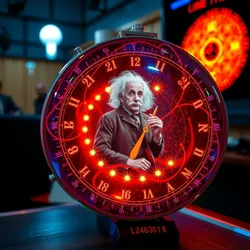The Quantum Paradox: Unraveling Time’s Tapestry

The Quantum Paradox, often referred to as "Unraveling Time’s Tapestry," is a theoretical phenomenon emerging from recent advancements in time travel and quantum mechanics. This paradox challenges established notions of causality and continuity, raising profound questions about the nature of reality itself.
Origin and Discovery
The concept of the Quantum Paradox was first introduced during the controversial Einstein Clone Project, a groundbreaking effort that aimed to recreate historical figures using advanced temporal technologies. The project utilized the ChronoSphere, a sophisticated time-travel device initially designed for observing rather than altering historical events. When the project successfully cloned Albert Einstein, it inadvertently triggered a cascade of quantum anomalies, leading to the first observation of the paradox.
Theoretical Framework
At its core, the Quantum Paradox arises from the interaction between time-travel technology and the quantum states of cloned entities. According to leading physicists involved in the project, including members of the Temporal Ethics Council, the paradox presents a unique challenge: reconciling the existence of a time-displaced clone with the immutable laws of quantum physics.
The paradox suggests that altering the timeline, even minimally, can result in a fracturing of the quantum fabric, creating multiple potential realities. These realities may coexist, compete, or even collapse into one another, posing significant risks to the stability of the known universe.
Proposed Resolutions
Several theoretical resolutions have been proposed to address the Quantum Paradox:
-
Quantum Entanglement Theory: This approach posits that the entangled states of cloned entities and their originals could provide a stabilizing effect, preventing the divergence of realities.
-
Temporal Coherence Principle: Advocated by the Temporal Mechanics: The Future of Physics symposium, this principle suggests that maintaining coherence in the temporal sequence of events could mitigate paradoxical outcomes.
-
Ethical Containment Strategy: The Temporal Ethics Council has proposed a containment strategy, focusing on ethical guidelines and limitations on temporal interventions to prevent further occurrences of the paradox.
Implications for Future Research
The Quantum Paradox has opened new avenues for research in both theoretical and applied physics. It challenges scientists to rethink the fundamental principles of causality and continuity and may lead to revolutionary developments in quantum computing and temporal dynamics.
Furthermore, the ethical implications of the paradox continue to be a topic of intense debate, with scholars and ethicists examining the potential consequences of unrestricted temporal manipulation.
See Also
- ChronoSphere
- Einstein Clone Project
- Temporal Ethics Council
- Quantum Computing
- Temporal Dynamics
References
-
Quantum Chronicles: The Einstein Enigma. Available at Quantum Chronicles.
-
Temporal Mechanics: The Future of Physics: Proceedings from the Temporal Mechanics Symposium. Available at Temporal Mechanics: The Future of Physics.
The Quantum Paradox remains a compelling and enigmatic problem, demanding continued exploration and ethical consideration in the quest to understand the complex tapestry of time and reality.